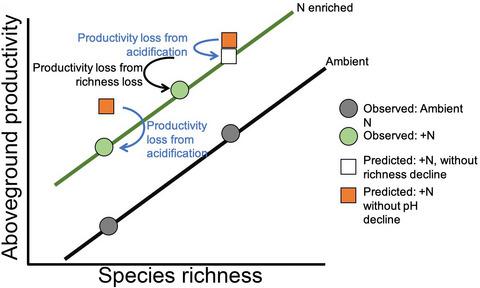当前位置:
X-MOL 学术
›
Glob. Change Biol.
›
论文详情
Our official English website, www.x-mol.net, welcomes your feedback! (Note: you will need to create a separate account there.)
Diversity-dependent soil acidification under nitrogen enrichment constrains biomass productivity.
Global Change Biology ( IF 11.6 ) Pub Date : 2020-09-01 , DOI: 10.1111/gcb.15329 Kaitlin Kimmel 1 , George N Furey 2 , Sarah E Hobbie 2 , Forest Isbell 2 , David Tilman 2, 3 , Peter B Reich 4, 5
Global Change Biology ( IF 11.6 ) Pub Date : 2020-09-01 , DOI: 10.1111/gcb.15329 Kaitlin Kimmel 1 , George N Furey 2 , Sarah E Hobbie 2 , Forest Isbell 2 , David Tilman 2, 3 , Peter B Reich 4, 5
Affiliation

|
In most plant communities, the net effect of nitrogen enrichment is an increase in plant productivity. However, nitrogen enrichment also has been shown to decrease species richness and to acidify soils, each of which may diminish the long‐term impact of nutrient enrichment on productivity. Here we use a long‐term (20 year) grassland plant diversity by nitrogen enrichment experiment in Minnesota, United States (a subexperiment within the BioCON experiment) to quantify the net impacts of nitrogen enrichment on productivity, including its potential indirect effects on productivity via changes in species richness and soil pH over an experimental diversity gradient. Overall, we found that nitrogen enrichment led to an immediate positive increment in productivity, but that this effect became nonsignificant over later years of the experiment, with the difference in productivity between fertilized and unfertilized plots decreasing in proportion to nitrogen addition‐dependent declines in soil pH and losses of plant diversity. The net effect of nitrogen enrichment on productivity could have been 14.5% more on average over 20 years in monocultures if not for nitrogen‐induced decreases in pH and about 28.5% more on average over 20 years in 16 species communities if not for nitrogen‐induced species richness losses. Together, these results suggest that the positive effects of nutrient enrichment on biomass production can diminish in their magnitude over time, especially because of soil acidification in low diversity communities and especially because of plant diversity loss in initially high diversity communities.
中文翻译:

氮富集下依赖多样性的土壤酸化限制了生物量的生产力。
在大多数植物群落中,氮富集的净作用是提高植物生产力。但是,氮的富集还显示会减少物种的富集并酸化土壤,每一种氮肥都可能减少养分富集对生产力的长期影响。在这里,我们通过美国明尼苏达州的氮富集实验(BioCON实验的一个子实验),通过长期(20年)的草原植物多样性来量化氮富集对生产力的净影响,包括氮肥对生产力的潜在间接影响。实验多样性梯度上物种丰富度和土壤pH的变化。总体而言,我们发现氮的富集导致生产力立即提高,但是在实验的后期,这种影响变得不明显了,随着施氮量的增加,土壤pH值的降低和植物多样性的丧失,施肥和未施肥地块生产力的下降成比例下降。如果不考虑氮的诱导pH降低,则在单培养中氮富集对生产力的净影响在20年内平均提高14.5%,如果不对因氮引起的pH降低,则在20年内平均提高约28.5%。物种丰富度损失。总之,这些结果表明,随着时间的推移,养分富集对生物量生产的积极影响可能会减弱,特别是由于低多样性社区的土壤酸化,尤其是由于最初高多样性社区的植物多样性丧失。
更新日期:2020-10-19
中文翻译:

氮富集下依赖多样性的土壤酸化限制了生物量的生产力。
在大多数植物群落中,氮富集的净作用是提高植物生产力。但是,氮的富集还显示会减少物种的富集并酸化土壤,每一种氮肥都可能减少养分富集对生产力的长期影响。在这里,我们通过美国明尼苏达州的氮富集实验(BioCON实验的一个子实验),通过长期(20年)的草原植物多样性来量化氮富集对生产力的净影响,包括氮肥对生产力的潜在间接影响。实验多样性梯度上物种丰富度和土壤pH的变化。总体而言,我们发现氮的富集导致生产力立即提高,但是在实验的后期,这种影响变得不明显了,随着施氮量的增加,土壤pH值的降低和植物多样性的丧失,施肥和未施肥地块生产力的下降成比例下降。如果不考虑氮的诱导pH降低,则在单培养中氮富集对生产力的净影响在20年内平均提高14.5%,如果不对因氮引起的pH降低,则在20年内平均提高约28.5%。物种丰富度损失。总之,这些结果表明,随着时间的推移,养分富集对生物量生产的积极影响可能会减弱,特别是由于低多样性社区的土壤酸化,尤其是由于最初高多样性社区的植物多样性丧失。


























 京公网安备 11010802027423号
京公网安备 11010802027423号